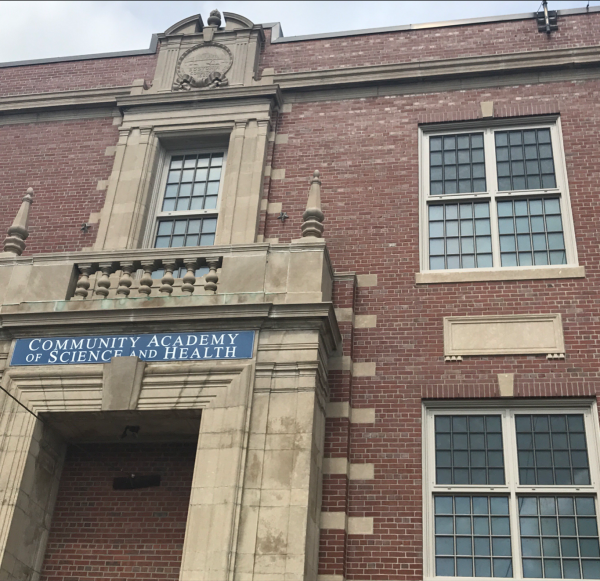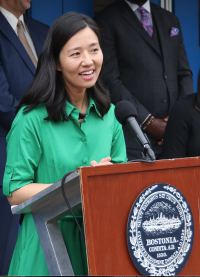May 13, 2022

The former Grover Cleveland school building on Charles Street in Fields Corner, which now houses Community Academy of Science and Health (CASH). The CASH school will stay in a rehabbed facility under Mayor Wu's plan.

Goal: Renovate or upgrade every facility before 2032; plan sees new construction
During a visit to the McKinley School in the city’s South End on Thursday, Mayor Michelle Wu announced an ambitious $2 billion (or more) “Green New Deal for BPS” initiative that would see every school in the Boston Public School system upgraded or renovated – and some new buildings constructed – within the next 10 years.
For many parents, teachers, and school observers, the effort seemed to be duplication of things announced before, like Mayor Martin Walsh’s BuildBPS program of five years ago. But the mayor and her team touted a new city-school management collaboration that they said could get things done this time, and quickly, with the “full force of city government.”
The plan will rely on new technology, new assessments of facilities, an equity lens in prioritizing students served, environmental sustainability, and about $2 billion-plus of potential funding from state, local, and, perhaps, private sources to realize its goal.
Of that funding, $605 million is included in the Capital Improvement Plan (CIP) now before the City Council for Phase 1 of the initiative, money that would get the ball rolling on the construction of a new educational complex for Madison Park Technical Vocational High School in Roxbury.
Local projects identified for Dorchester and Mattapan include reconstruction of the old Cleveland Middle School (which now houses CASH – Community Academy of Science and Health) in Fields Corner, and a new PreK-6th grade school in Dorchester/Mattapan that would potentially require closure and mergers of existing schools.
Beyond that, Wu said, “Every school and school community” would be touched by the program with things like new bathrooms, outdoor spaces, gardens, solar panels, and fresh water. I would like us to have fully redone every school building in Boston in the next decade. That is ambitious, and if it can be reined in faster – great.”
She continued, “We’re moving as fast as we can, but I know that our pace of how we do things cannot be at the usual speed of government. We have to move with the urgency of our families…We need to prove it works. In some ways, previous processes have just exacerbated the frustrations of families in certain ways.”
School Committee Chair – and Dorchester resident – Jeri Robinson said students in Boston should have buildings just as nice as those of workers downtown and in the Seaport.
“As Bostonians we’ve been here before,” she said. “Many times, we’ve heard the promises and we see some things happen, but for the majority of our kids, that isn’t the experience…They deserve the best that Boston can give them.”
Wu also noted that she was part of BuildBPS when she was a city councillor, but she said that process fell short and frustrated parents.
“Even when we restarted the commitment to new buildings, it was one school every seven years,” she said. “So, we really need to flip that to where we’re doing many schools at the same time, tightening up the timelines for these processes.”
The biggest news for Dorchester and Mattapan was the announcement that a new Madison Park educational complex, funding for which is in the proposed capital budget, would be built on its current site in Roxbury. City Operations Chief Dion Irish, who will co-lead the New Deal with BPS Operations Chief Indira Alvarez, said a $500,000 assessment study of Madison Park could begin as early as July 1, if approved. He estimated a three- to five-year process for a new building to be student-ready.
Wu said city and school officials visited other vocational schools in places like Worcester hoping to get ideas for what would be good for a new Madison Park.
“There are incredible things happening at Madison Park…but the building feels so outdated, and we need to make sure we have cutting-edge, state-of-the-art facilities for our young people,” she said. “Madison Park is often left off the list when we think about facilities…The goal is to bring a brand-new Madison Park.”
State Rep. Russell Holmes said Madison Park has been the focus of concerns aired by him and other elected officials of color. He said they met last month with Wu and administration where they learned that Madison Park was going to lose some of its state licenses because the building was too antiquated.
“We should not be having to consider the thought of state receivership or not getting licenses because of the physical decay of our buildings,” he said. “We have the money. We have the resources. It is absolutely possible to do this, and it should have been done a long time ago.”
In what could be a more controversial building plan, the long-promised new PreK-6th grade school would house students on the west side of Dorchester and Mattapan. However, according to the Green New Deal website, building that school will require looking at merging several small neighborhood schools.
The new school had been promised in 2021, but a site couldn’t be located. Under the New Deal, the city would commit funding, site selection would be accelerated, and the design work would be launched. Talks with the various schools about mergers, and potential closings, is to start this year.
“Beginning SY22-23,” website documents noted, “BPS will engage several smaller Dorchester and Mattapan school communities – including but not limited to the Shaw, the Taylor, the Greenwood, Lee Academy, the Kenny, and the Holmes – to determine which schools will ultimately merge into a new Dorchester elementary school.”
In Fields Corner, renovating the old Cleveland building involves several moves because the Community Academy of Science and Health (CASH) will stay in rehabbed facility and BAA will be moving to their new school in the Fenway.
Next fall, CASH will move into the old BAA space while the city renovates the inside of the current CASH space at a cost of $2.15 million for roof replacement and outside exterior repairs.
Beyond the Phase 1 projects, Wu and BPS Supt. Brenda Cassellius said simple upgrades like bathrooms and catching up with deferred maintenance would be key to the plan.
“This is an opportunity today to put a down payment on those promises that the City of Boston is making to our children, and they deserve nothing less,” said Cassellius, who is leaving the district at the end of June.
She noted that the facilities team right now is working on bathrooms, clean drinking water, covering radiators so children don’t get burned, and fixing windows all over the district.
Said Wu: “We’ere seeing that [deferred maintenance] has built and reinforced mistrust between the city and the community we are here to serve.”
Irish and Alvarez said the city and schools have created a dashboard that will be constantly updated in assessing building maintenance needs in a number of categories, from roofs to bathrooms to boilers. That data will come together to form an overall building score – with 75 percent coming from the maintenance needs and 25 percent coming from student population demographics. The scores are used to determine priorities in the program.
Irish said they are now using information that is already known to them from previous facilities surveys. However, they are contracting with a company to do a full-scale assessment of all facilities in the district that will be added to the dashboard upon completion.
Getting the job done, Irish said, will be all about increasing the staff and working in collaboration. The city pledged to add 10 new positions to the Public Facilities Department (PFD) to work on the New Deal, while BPS will add 15 new positions for the same purpose.


